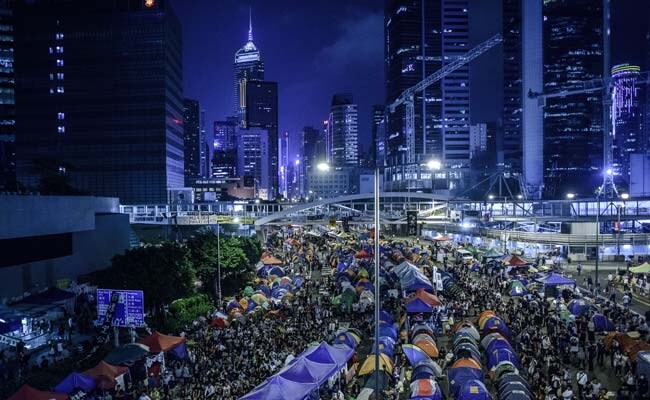
Pro-democracy protesters gather at the main protest site in Hong Kong on October 24, 2014. (Agence France-Presse)
Hong Kong:
Hong Kong democracy activists on Tuesday marked one month of mass protests, calling on supporters to gather for an evening rally wearing the masks they have used to ward off police tear gas and pepper spray.
Organisers striving to inject new momentum into the movement told crowds to gather at the main protest camp opposite the city's government headquarters for commemorations starting with an 87-second silence at 5:57 pm (0957 GMT).
At that time on September 28, riot police shot 87 volleys of tear gas at crowds of largely peaceful protesters who had taken over a highway near the city parliament.
That decision backfired, drawing tens of thousands of sympathisers onto the streets and kickstarting a movement that has become the most concerted challenge to Beijing since the bloody 1989 Tiananmen protests.
Demonstrators are calling on Beijing to rescind its insistence that candidates standing to be the city's leader in 2017 must be vetted by a loyalist committee, an arrangement demonstrators deride as "fake democracy".
But the Chinese government shows no sign of backing down and protest leaders are unsure of how to achieve their goals.
Occupy Central, one of the main protest groups, called on supporters to don the same protective masks and goggles they wore to defend themselves when the street rallies descended into chaotic confrontations.
The protests have been dubbed the "Umbrella Movement" following the creative ways demonstrators used them to shelter from the heat, torrential rain, pepper spray and police batons.
A Facebook group has called on supporters to open umbrellas en masse at 6 pm to "express our disappointment and outrage" over police heavy-handedness and the lack of political progress. More than 9,000 people have so far pledged to take part.
Hu Jia, a prominent Chinese dissident on the mainland currently under house arrest, said he would unfurl his own umbrella in solidarity with Hong Kong.
"I will participate in this event. In my home prison in Beijing," he told AFP.
- Talks stalled -
Now into their fifth week, the protests are at something of an impasse.
Student leaders held talks with government negotiators one week ago but made little headway, while a planned poll to gauge the movement's response to the government was shelved on Sunday.
At the same time, the movement's leaders are aware the disruption caused by their roadblocks has caused mounting frustration among some Hong Kongers.
The city's Beijing-backed leader Leung Chun-ying has seen his popularity nosedive during the crisis.
A new poll by the Chinese University of Hong Kong showed Mr Leung now scores 38.6 on an approval scale among voters which runs from 0 to 100, his lowest since taking office in March 2012 when his score was 53.9.
Protest camps have been frequently attacked by angry locals and masked thugs, some of whom are thought to have links to the city's murky criminal triad gangs.
The police have also repeatedly clashed with demonstrators during attempts to clear some of the protest camps and ease traffic disruption.
Organisers striving to inject new momentum into the movement told crowds to gather at the main protest camp opposite the city's government headquarters for commemorations starting with an 87-second silence at 5:57 pm (0957 GMT).
At that time on September 28, riot police shot 87 volleys of tear gas at crowds of largely peaceful protesters who had taken over a highway near the city parliament.
That decision backfired, drawing tens of thousands of sympathisers onto the streets and kickstarting a movement that has become the most concerted challenge to Beijing since the bloody 1989 Tiananmen protests.
Demonstrators are calling on Beijing to rescind its insistence that candidates standing to be the city's leader in 2017 must be vetted by a loyalist committee, an arrangement demonstrators deride as "fake democracy".
But the Chinese government shows no sign of backing down and protest leaders are unsure of how to achieve their goals.
Occupy Central, one of the main protest groups, called on supporters to don the same protective masks and goggles they wore to defend themselves when the street rallies descended into chaotic confrontations.
The protests have been dubbed the "Umbrella Movement" following the creative ways demonstrators used them to shelter from the heat, torrential rain, pepper spray and police batons.
A Facebook group has called on supporters to open umbrellas en masse at 6 pm to "express our disappointment and outrage" over police heavy-handedness and the lack of political progress. More than 9,000 people have so far pledged to take part.
Hu Jia, a prominent Chinese dissident on the mainland currently under house arrest, said he would unfurl his own umbrella in solidarity with Hong Kong.
"I will participate in this event. In my home prison in Beijing," he told AFP.
- Talks stalled -
Now into their fifth week, the protests are at something of an impasse.
Student leaders held talks with government negotiators one week ago but made little headway, while a planned poll to gauge the movement's response to the government was shelved on Sunday.
At the same time, the movement's leaders are aware the disruption caused by their roadblocks has caused mounting frustration among some Hong Kongers.
The city's Beijing-backed leader Leung Chun-ying has seen his popularity nosedive during the crisis.
A new poll by the Chinese University of Hong Kong showed Mr Leung now scores 38.6 on an approval scale among voters which runs from 0 to 100, his lowest since taking office in March 2012 when his score was 53.9.
Protest camps have been frequently attacked by angry locals and masked thugs, some of whom are thought to have links to the city's murky criminal triad gangs.
The police have also repeatedly clashed with demonstrators during attempts to clear some of the protest camps and ease traffic disruption.
Track Latest News Live on NDTV.com and get news updates from India and around the world

